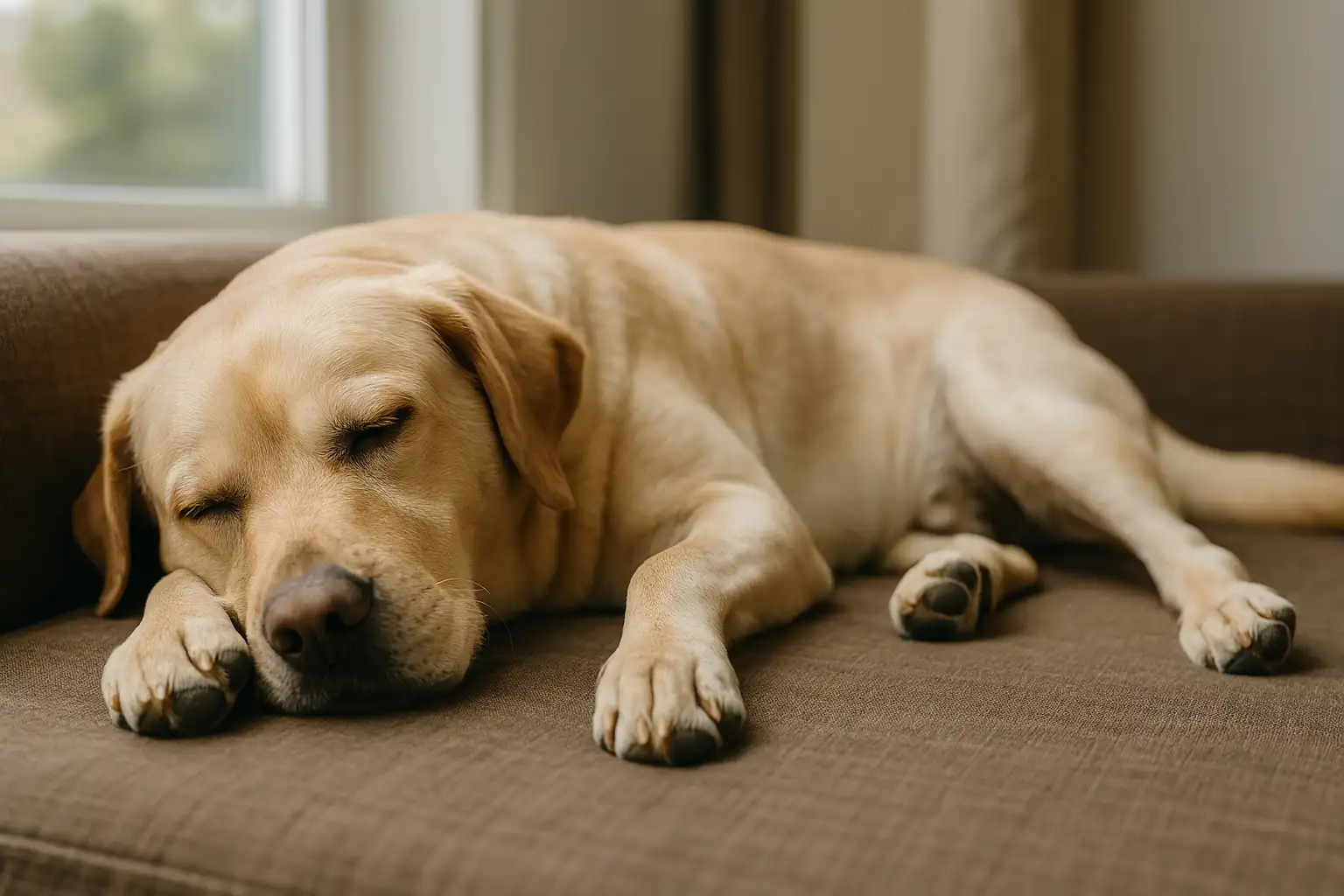Worried why your dog sleeps all day? While dogs typically sleep 12-14 hours daily, excessive sleep could signal problems. I’ve researched extensively why dogs sleep all day and consulted with vets to separate normal from concerning sleep patterns.
Do you ever watch your dog snoozing the day away and wonder, “Why does my dog sleep all day?” I certainly did with my rescue Lab, Cooper. He seemed to spend more time in dreamland than awake, and I couldn’t help but worry. Was this normal, or was something wrong? After years of dog parenting and countless vet consultations about why dogs sleep all day, I’ve learned that understanding canine sleep patterns involves several important factors.
Common Reasons Why Does My Dog Sleep All Day
Dogs naturally require more sleep than humans. While we function well on 7-9 hours, our canine companions need significantly more downtime to recharge their batteries. Understanding why does my dog sleep all day starts with recognizing these natural differences.
Age-related Sleep Patterns in Dogs
Just like humans, a dog’s age dramatically affects their sleep requirements:
- Puppies (0-6 months): These little bundles of energy can sleep a whopping 18-20 hours daily. So if you’re wondering “why does my puppy sleep all day,” don’t be alarmed – they’re growing rapidly, and their bodies need that recovery time. When my Border Collie Luna was a puppy, she’d play intensely for 30 minutes, then crash for 3-4 hours straight.
- Adolescent dogs (6-18 months): Slightly less sleep than puppies, averaging 16-18 hours. They’re still developing but don’t need quite as much recovery time.
- Adult dogs (1.5-7 years): Most healthy adult dogs sleep 12-14 hours per day. This includes nighttime sleep and daytime naps.
- Senior dogs (7+ years): As dogs enter their golden years, they typically require more sleep again – often 14-18 hours daily. If you’re asking “why does my older dog sleep all day,” it’s usually normal aging. My 12-year-old Cooper now spends about 16 hours sleeping each day, a significant increase from his adult years.
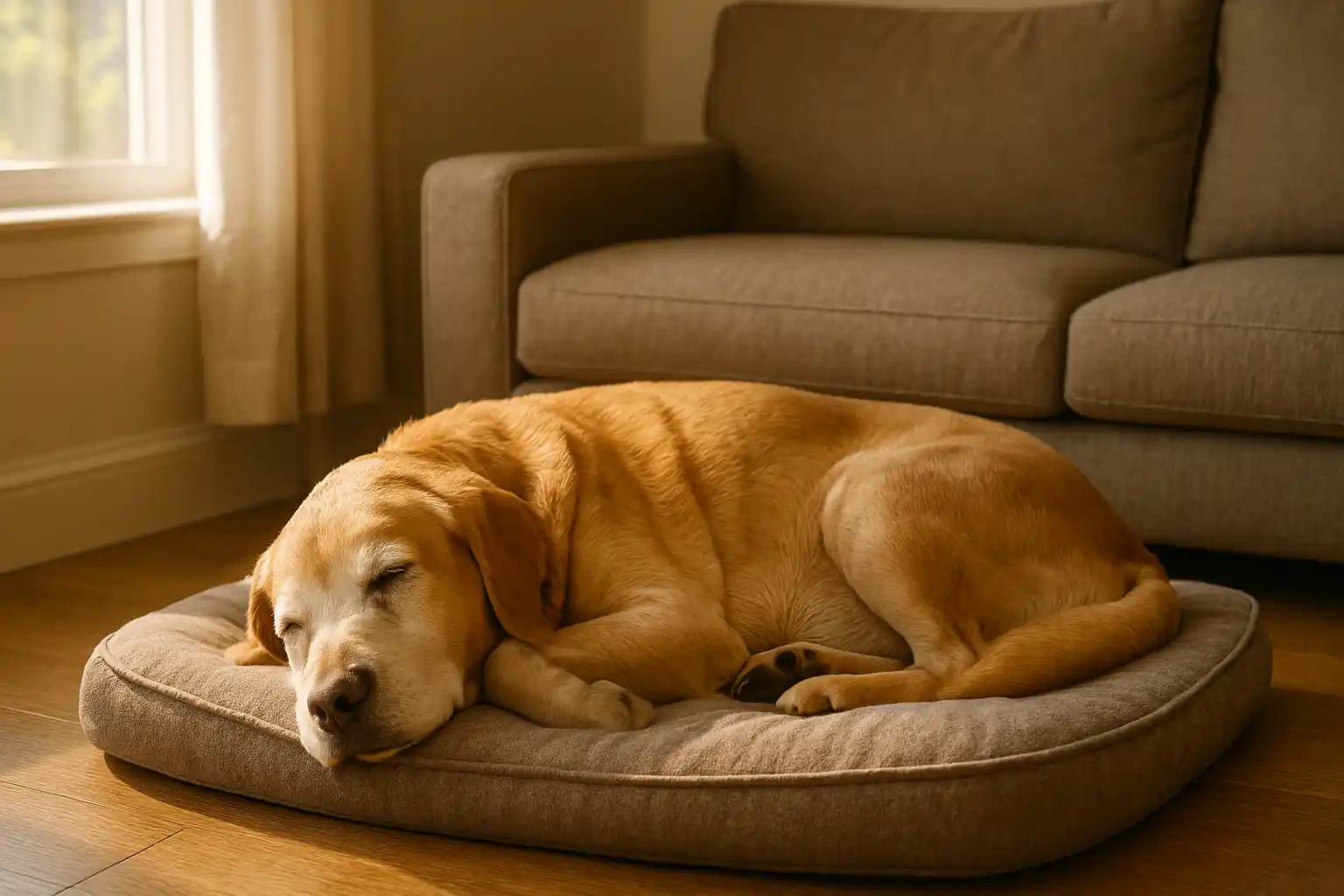
Health Issues Leading to Why Does My Dog Sleep All Day
The most common reason why does my dog sleep all day involves their health status. If your previously active dog suddenly starts sleeping all day, it could indicate a health concern. Some common health-related reasons why does my dog sleep all day include:
- Hypothyroidism: This common endocrine disorder reduces metabolism and often leads to lethargy and increased sleep. When my neighbor’s Golden Retriever was diagnosed with hypothyroidism, increased sleeping was one of the first symptoms they noticed.
- Diabetes: Dogs with undiagnosed or poorly managed diabetes may sleep more as their bodies struggle to convert food into energy properly.
- Heart disease: As the heart becomes less efficient, dogs may tire more easily and require additional rest.
- Anemia: With fewer red blood cells carrying oxygen, anemic dogs often experience fatigue and increased sleep needs.
- Depression or anxiety: Yes, dogs can experience mental health issues too. If you’re wondering “why does my dog suddenly sleep all day,” major life changes like moving homes or losing a companion can trigger depression, resulting in excessive sleep.
If you notice a sudden change in why your dog sleeps all day alongside other symptoms like changes in appetite, water consumption, or behavior, it’s essential to consult your veterinarian promptly.
Breed-Specific Sleep Behaviors
When looking at why does my dog sleep all day, it’s important to consider their breed tendencies. Your dog’s breed significantly influences their sleep requirements:
- Working breeds (Border Collies, Australian Shepherds, German Shepherds): These high-energy dogs typically sleep less, around 12-14 hours daily. If you have a working breed that sleeps all day, it might be worth investigating as this is unusual for these active dogs.
- Giant breeds (Great Danes, Mastiffs, Newfoundlands): Despite their imposing size, these gentle giants are often champion sleepers, requiring 16-18 hours of sleep daily. If you’re asking “why does my Great Dane sleep all day,” it’s completely normal – their large bodies demand more recovery time.
- Brachycephalic breeds (Bulldogs, Pugs, Boston Terriers): If you’re wondering “why does my bulldog sleep all day,” it’s common for these flat-faced dogs to sleep more – up to 14-16 hours – partly because their breathing difficulties can make them tire more easily.
- Toy breeds (Chihuahuas, Yorkshire Terriers): Small dogs often have higher metabolisms and may sleep slightly less than larger breeds, though individual variation exists.
Remember that these are generalizations – your individual dog may have different sleep needs based on their unique personality and health status. Understanding why does my dog sleep all day may require considering their breed tendencies alongside other factors.
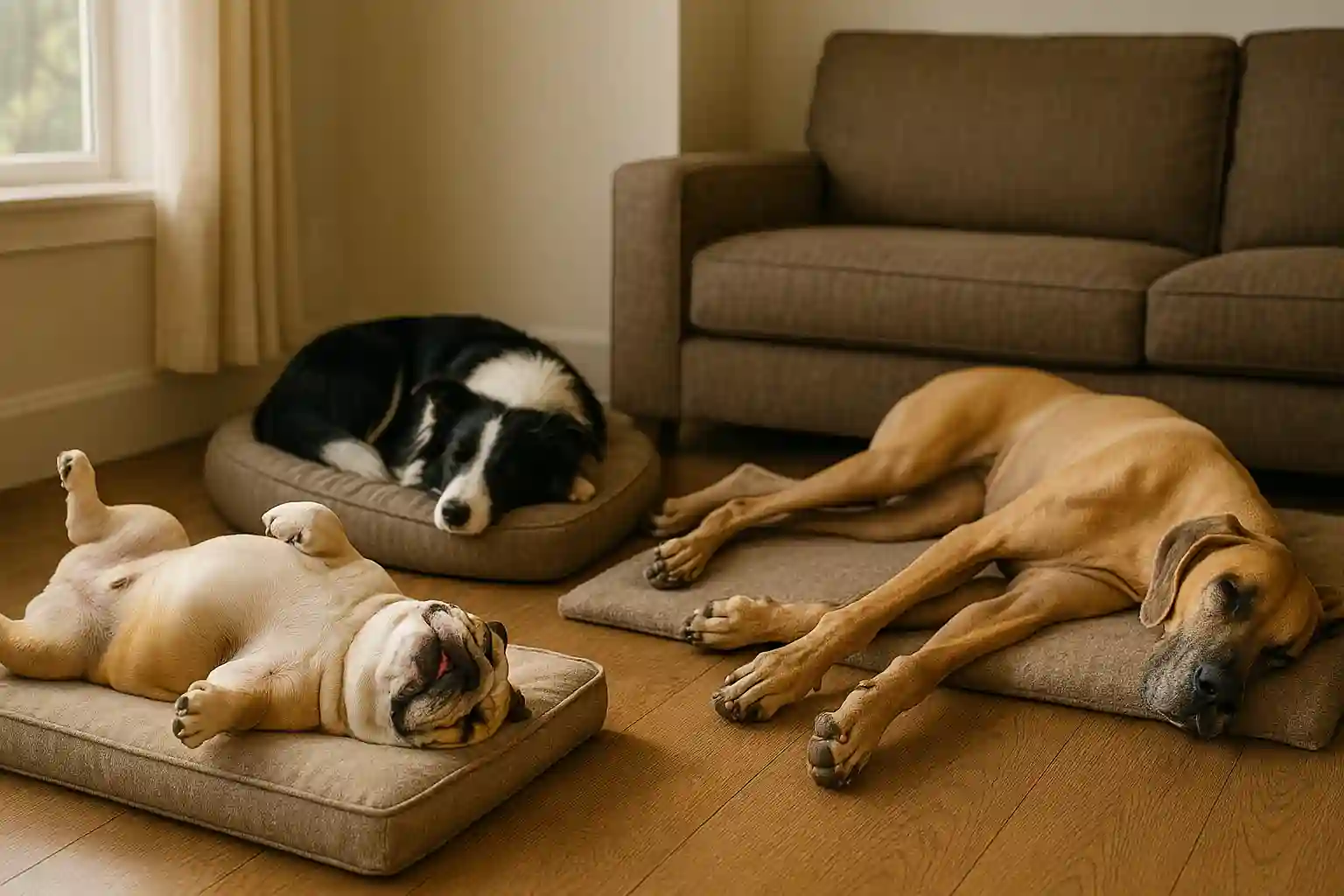
The Impact of Lifestyle on Why Does My Dog Sleep All Day
Your dog’s daily routine and environment play crucial roles in determining why does my dog sleep all day. Just like humans, dogs need appropriate exercise and nutrition to maintain healthy sleep cycles.
Effects of Exercise on a Dog’s Sleeping Habits
Exercise and sleep quality are intimately connected for dogs:
- Insufficient exercise: Without adequate physical activity, your dog may become restless and struggle to settle into deep, restorative sleep. I noticed this with Cooper during a rainy week when our walks were shortened – he seemed to sleep more hours but was less rested.
- Appropriate exercise: Dogs who receive breed-appropriate exercise typically sleep more soundly, though not necessarily longer. My neighbor’s Husky sleeps only about 12 hours daily but sleeps deeply after her daily 5-mile runs.
- Over-exercise: While rare, excessive exercise can lead to exhaustion and disrupted sleep patterns. This is especially true for puppies, seniors, and dogs with underlying health conditions.
The quality of sleep matters as much as quantity when understanding why does my dog sleep all day. After implementing a consistent 45-minute morning walk and 30-minute evening play session, Cooper began sleeping less during the day but seemed more rested and alert during his waking hours.
For active breeds experiencing lethargy, check out our guide on best exercise routines for high-energy dogs to help them achieve better sleep quality. A proper exercise routine can often explain why does my dog sleep all day – they simply aren’t getting enough activity.
Nutrition and Its Role in Dog Energy Levels
What your dog eats directly impacts their energy levels and explains why does my dog sleep all day:
- Poor quality food: Diets lacking essential nutrients or containing excessive fillers may explain why does my dog sleep all day, as they leave your dog feeling lethargic.
- Food sensitivities: Some dogs have sensitivities to common ingredients like chicken, beef, or grains, which can cause inflammation and fatigue, contributing to why does my dog sleep all day.
- Appropriate nutrition: A balanced diet tailored to your dog’s age, size, and activity level provides sustained energy and helps regulate sleep cycles, preventing excessive daytime sleeping.
- Meal timing: Feeding schedule matters too. I noticed Cooper was sleeping more after I switched to once-daily feeding. Returning to smaller, twice-daily meals improved his energy distribution throughout the day.
If your dog seems excessively sleepy and you’re constantly wondering “why does my dog sleep all day,” review their diet and nutritional needs. Sometimes, a simple dietary adjustment can make a significant difference in energy levels and explain why does my dog sleep all day.
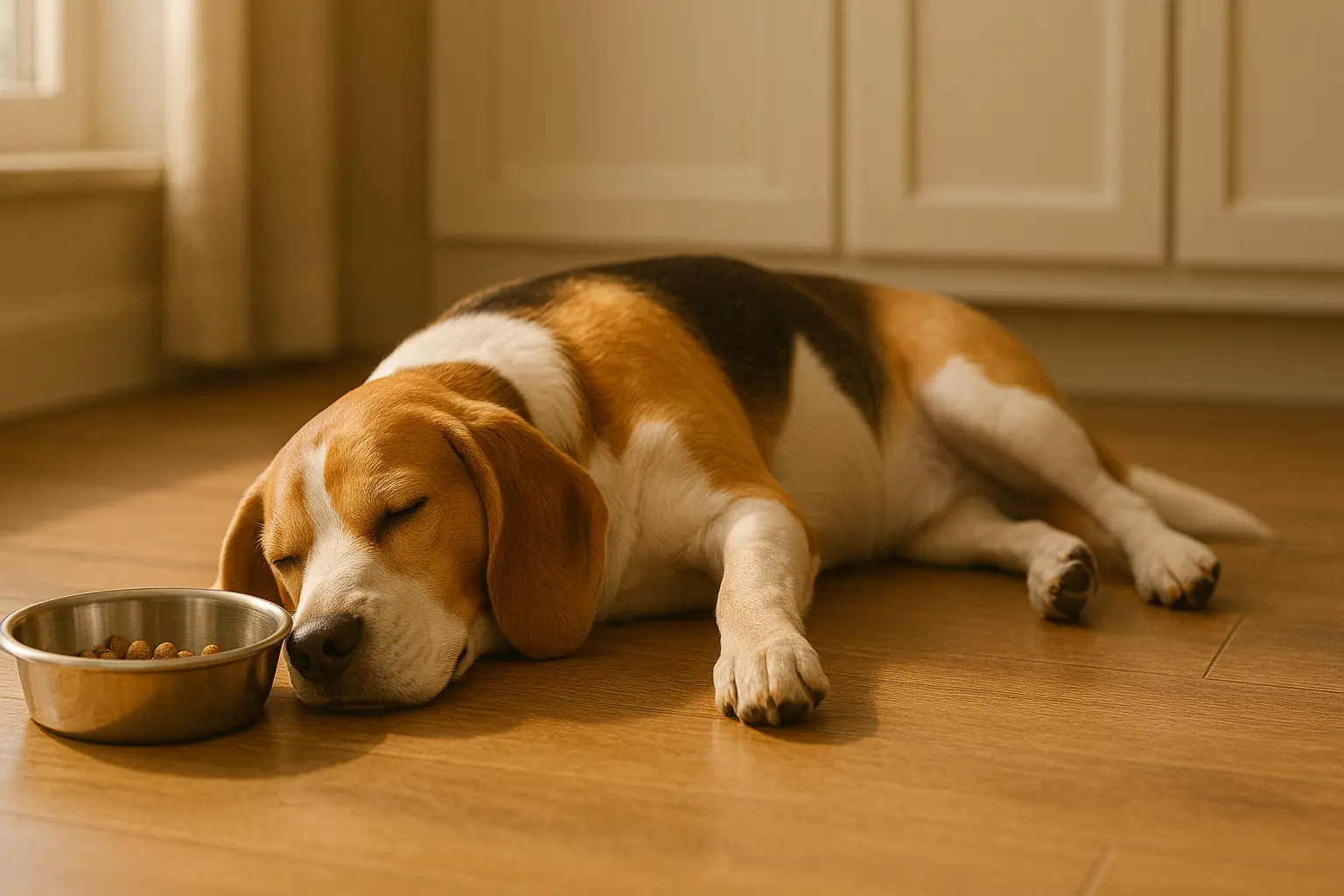
Comparing Normal Sleep Patterns vs. Why Does My Dog Sleep All Day Excessively
Understanding the difference between healthy sleep and potential problems that cause why does my dog sleep all day is crucial for every dog owner.
Signs of Healthy Sleep vs. Why Your Dog Might Sleep All Day Abnormally
When analyzing why does my dog sleep all day, it’s important to understand healthy sleep looks like this:
- Sleep cycles: Dogs cycle through REM and non-REM sleep just like humans, but their cycles are shorter – typically 20 minutes compared to our 90 minutes.
- Sleep positions: Healthy dogs change positions occasionally during sleep. The “superman” position (legs stretched out), curled up, or on their side are all normal.
- Dreaming: Twitching paws, soft whimpers, or gentle running movements during sleep are usually signs of normal dreaming.
- Easy waking: A healthy sleeping dog should be relatively easy to wake and alert shortly after waking.
Potential signs of sleep disorders include:
- Excessive difficulty waking: If your dog seems unusually difficult to rouse, this could indicate a problem.
- Disorientation after waking: While brief grogginess is normal, prolonged confusion could signal cognitive issues or seizures.
- Sleep apnea: Loud snoring, gasping, or periods where breathing stops temporarily may indicate sleep apnea, especially common in brachycephalic breeds.
- Narcolepsy: Sudden collapse into sleep during active periods could indicate narcolepsy, a neurological condition.
I once noticed Cooper would sometimes wake up gasping after sleeping all day, which prompted a vet visit. It turned out he had mild sleep apnea related to his weight. After helping him lose a few pounds, he stopped showing signs of why does my dog sleep all day and his sleep quality improved dramatically.
When to Be Concerned About Why Your Dog Sleeps All Day
While variation in sleep patterns is normal, certain signs warrant veterinary attention when investigating why does my dog sleep all day:
- Sudden changes: If your normally active dog suddenly starts sleeping significantly more (or less), consult your vet.
- Difficulty waking: If your dog seems unusually difficult to rouse from sleep, this could indicate neurological issues.
- Extreme lethargy: If your dog sleeps all day and shows a lack of interest in food, play, or walks when awake, seek veterinary care promptly.
- Disorientation: If your dog sleeps all day and appears confused upon waking, especially in older dogs, this could be a sign of cognitive dysfunction syndrome (doggy dementia).
- Physical symptoms: If your dog sleeps all day accompanied by vomiting, diarrhea, coughing, or changes in urination patterns, requires immediate veterinary attention.
Remember, you know your dog best. If something about their sleep seems off, trust your instincts and consult a professional. For more guidance on recognizing health emergencies, visit our pet health page.
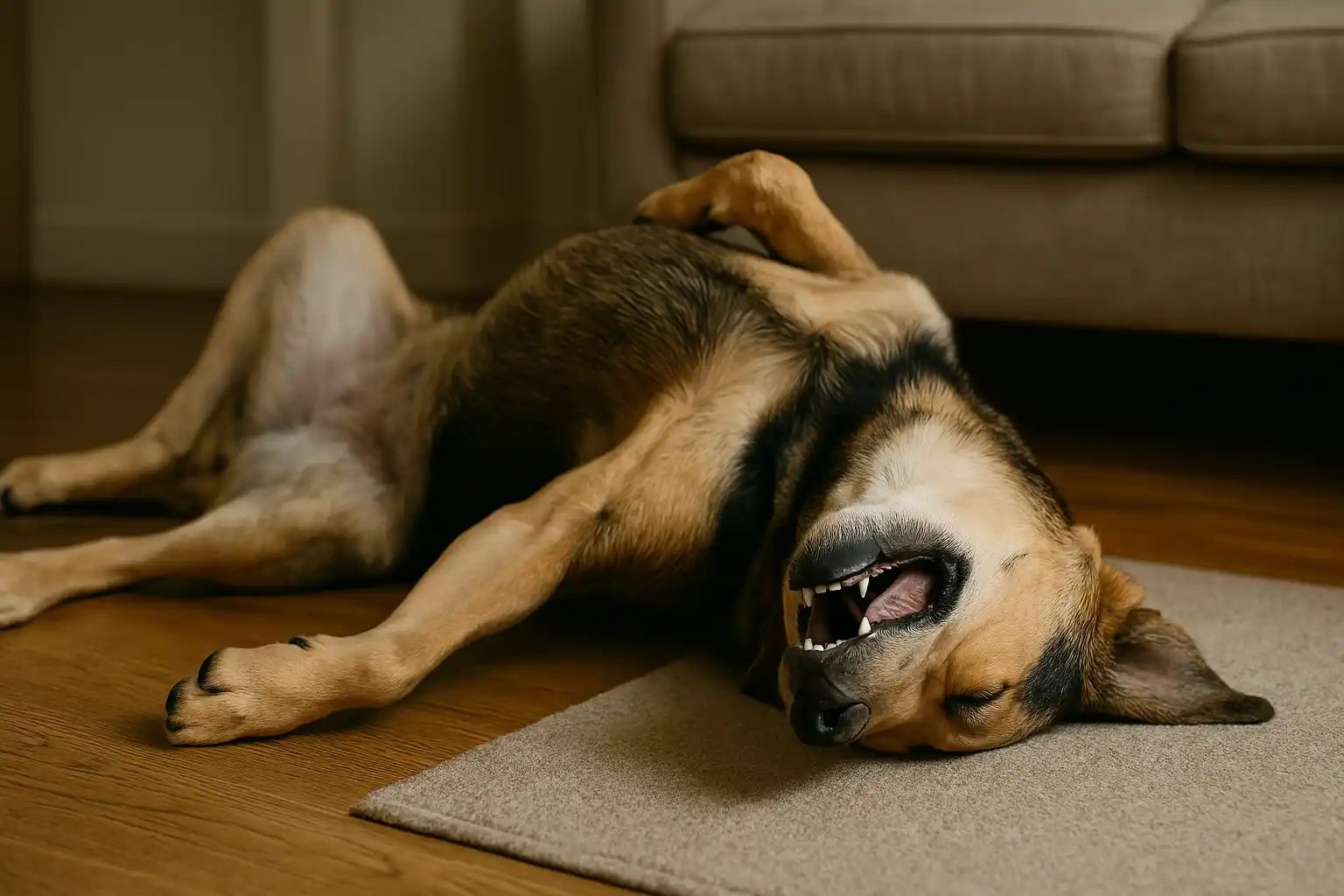
Managing Your Dog’s Sleep Routine to Prevent Why Does My Dog Sleep All Day
Creating a healthy sleep environment and routine can help ensure your dog doesn’t sleep all day but gets the right amount and quality of sleep.
Tips for Encouraging Healthy Sleep in Dogs Who Sleep All Day
If you’re concerned about why does my dog sleep all day, implementing these strategies can help optimize their sleep patterns:
- Consistent schedule: Dogs thrive on routine. If you’re experiencing why does my dog sleep all day, try to keep walking, feeding, play, and bedtimes consistent to regulate their body clock.
- Appropriate exercise: Ensure your dog receives breed-appropriate physical activity daily. For most adult dogs, 30-60 minutes of exercise helps prevent excessive sleeping during the day.
- Mental stimulation: A physically tired dog might sleep, but a mentally tired dog will sleep well. Puzzle toys, training sessions, and scent games provide crucial mental exercise.
- Regular veterinary check-ups: Annual exams can catch health issues that might affect sleep before they become serious.
- Weight management: Overweight dogs often develop sleep problems, including sleep apnea. Maintaining a healthy weight improves sleep quality.
After implementing a consistent evening routine with Cooper – a 30-minute walk, 15 minutes of training, dinner, then quiet time – his sleep became more predictable and I no longer wondered why does my dog sleep all day. He now sleeps primarily at night with just a few daytime naps, rather than sleeping excessively throughout the day.
For more training tips that can help establish healthy routines, check out our basic dog training guide.
How to Create an Optimal Sleeping Environment for Your Dog
Creating an optimal sleeping environment is crucial, especially if you’re concerned about why does my dog sleep all day:
- Comfortable bedding: Provide age-appropriate bedding. Puppies and adults might prefer firmer surfaces, while seniors benefit from orthopedic beds that cushion aging joints.
- Temperature control: Dogs sleep best in moderate temperatures (65-75°F/18-24°C). Too hot or cold can disrupt sleep.
- Noise management: While dogs can sleep through familiar sounds, sudden or unusual noises disrupt sleep. Consider white noise for sensitive dogs.
- Light control: Many dogs sleep better in darker environments, especially at night. Consider dimming lights in evening hours.
- Location choices: Some dogs prefer sleeping near their humans, while others need their own space. Respect your dog’s preference while ensuring safety.
When Cooper developed arthritis, switching to an orthopedic bed made a remarkable difference in his sleep quality. He went from restless nights with frequent position changes to sleeping soundly through the night. If you’re considering an upgrade, see our review of the best orthopedic dog beds for aging pups.
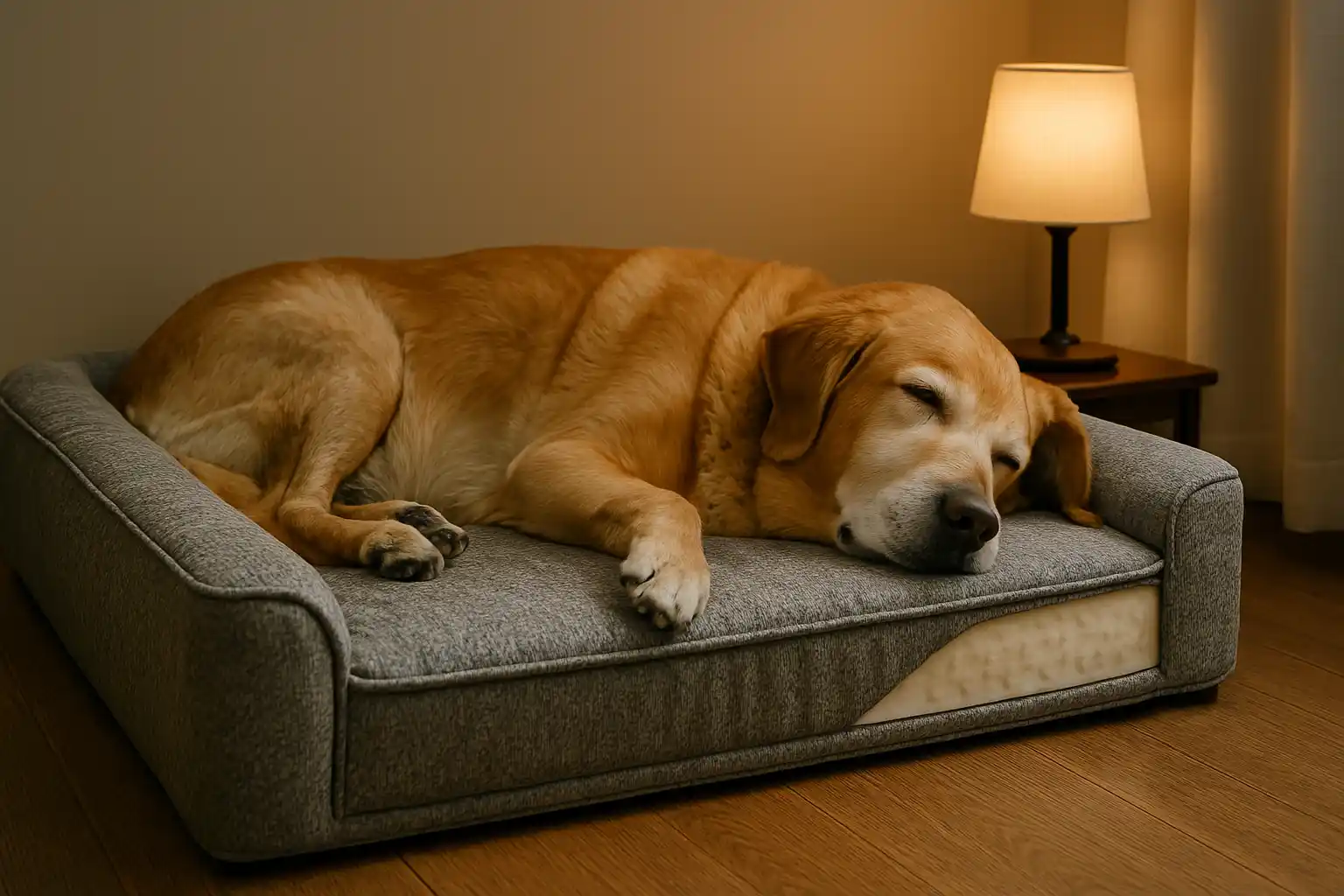
Understanding the Science Behind Why Does My Dog Sleep All Day
Dogs have different sleep patterns than humans, which explains why does my dog sleep all day compared to our single nighttime sleep cycle:
- Polyphasic sleepers: Unlike humans who are monophasic (one main sleep period), dogs are polyphasic, meaning they sleep multiple times throughout the day and night.
- Adaptable sleepers: Dogs can quickly fall asleep and wake up alert – an evolutionary trait from their wild ancestors who needed to be ready for hunting or danger.
- Light sleepers: Many dogs sleep lightly, remaining somewhat aware of their surroundings even while resting.
- REM sleep: Dogs spend about 10% of their sleep in REM (the dreaming stage), compared to humans’ 25%. This is when you’ll notice twitching, “running,” or soft barks.
Understanding these natural patterns helped ease my concerns about Cooper’s sleep habits. What seemed excessive to me was simply normal dog behavior distributed differently throughout the day. It explains why does my dog sleep all day compared to humans who concentrate their sleep at night.
FAQs About Why Does My Dog Sleep All Day
Is it normal for my dog to sleep 20 hours a day?
While puppies and senior dogs may approach this amount, it’s excessive for healthy adult dogs. If your adult dog sleeps all day (approximately 20 hours), especially if it’s a recent change, consult your veterinarian.
Why does my dog sleep all day and then seem active at night?
Dogs are naturally crepuscular (most active at dawn and dusk). If your dog sleeps all day and becomes energetic at night, try shifting their exercise and play to early evening to help adjust their schedule.
Why does my dog suddenly sleep all day when they used to be active?
Sudden changes in sleep patterns warrant veterinary attention. If your dog abruptly starts sleeping all day, it could indicate illness, pain, or age-related changes that need medical evaluation.
Why does my dog twitch and whimper while sleeping?
This is typically normal dreaming behavior occurring during REM sleep. Unless your dog seems distressed or the movements are violent, there’s usually no cause for concern.
Should I be worried if my senior dog sleeps all day?
Senior dogs naturally sleep more than younger dogs. However, if your older dog suddenly starts sleeping significantly more or shows other symptoms like confusion upon waking, appetite changes, or incontinence, consult your veterinarian.
Understanding why does my dog sleep all day takes time and careful observation. What might seem like excessive sleep could simply be normal for your dog’s age, breed, and lifestyle. However, sudden changes in how much your dog sleeps or extreme lethargy deserve veterinary attention. By providing consistent routines, appropriate exercise, and comfortable sleeping environments, you can help ensure your furry friend gets the quality rest they need without concerning sleep issues.
Are you still wondering “why does my dog sleep all day” or concerned about other canine behaviors? Explore our comprehensive dog sleep guide for more insights, along with our articles on puppy sleep patterns and senior dog care. Your dog’s wellbeing is our priority at PawlyDaily!

